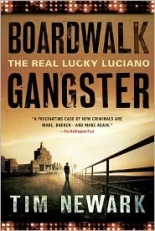
Caporegime

Joined: Aug 2001
Posts: 18,238
The Ravenite Social Club
|
Has anyone read this book? :  Boardwalk Gangster Boardwalk Gangster: The Real Lucky Luciano by Doug Bentin on As the old-school strippers tell a young Rose Louise Hovick in GYPSY, “You gotta have a gimmick.” A catchy name helps, too. Salvatore Lucania? Nope. Charles Luciano? Nuh-uh. Lucky Luciano? “Lucky” because he once took a three-layered ass-kicking from the cops and didn’t die. Alliterative and provocative. That’ll work.
In BOARDWALK GANGSTER: THE REAL LUCKY LUCIANO, you do get a sense from author Tim Newark that Luciano’s posthumous reputation needed some kind of boost. For the first half of his criminal life, he was a smart guy, rising through the mob ranks as a hitman and body guard for Joe Masseria. But by the end of the 1920s and the retirement of Johnny Torrio in Chicago, who handed the Outfit over to Al Capone, Luciano had been wooed from the old way of doing things.
His idea was to keep the profile as low as possible and work with anyone who could help you, whereas Masseria refused even to meet with Jewish gangsters like Mayer Lansky, Arnold Rothstein and Bugsy Siegel. So Luciano had Masseria subtracted from the equation and then took over his family.
The government couldn’t find a way to nail Luciano on murder, so they adapted the Capone-trap and went after him for lesser crimes, and in 1936, the judge in Luciano’s trial on prostitution charges cold-cocked him with a sentence of 30 to 50 years.
And this is where Newark’s book gets really interesting. When the U.S. entered World War II, Naval Intelligence became very concerned that Axis saboteurs would cause trouble along the Eastern seaboard. The mob, which controlled the dock workers, offered to keep an eye on things in return for certain small favors, one of which was to allow Luciano to return to Sicily.
A deal was struck and Lucky headed for the land of his birth. He said that that he could serve as middleman between the Allies and the locals to make the invasion of Italy less explosive. His apparent success has been the major factor in his story ever since.
But Newark claims that Luciano had little, if anything, to do with the Allies in Sicily and Italy. In fact, after he slipped off to Cuba after the war, and then got run out in 1947, he lived for the next 17 years in Sicily on the charity of his pals. He was never the kingpin of the international narcotics trade, as he has been credited with being. Authorities just claimed he was because they needed a straw man to dangle in front of the public.
After all, it was better to blame a known criminal mastermind than it was to blow the whistle on half the government officials between Italy and here. This same straw-man scam had worked during the Depression with many of the hoods of that era — Machine Gun Kelly, Ma Barker and others — and it worked again with Luciano
Newark shows us a different take on the Mafia and especially on one of its star attractions. It’s a relatively short book, built more for speed than intensity. After reading it, you may never think of big-time organized crime lords quite the same way again. —Doug Bentin
Don Cardi  Five - ten years from now, they're gonna wish there was American Cosa Nostra. Five - ten years from now, they're gonna miss John Gotti. Five - ten years from now, they're gonna wish there was American Cosa Nostra. Five - ten years from now, they're gonna miss John Gotti.
|



